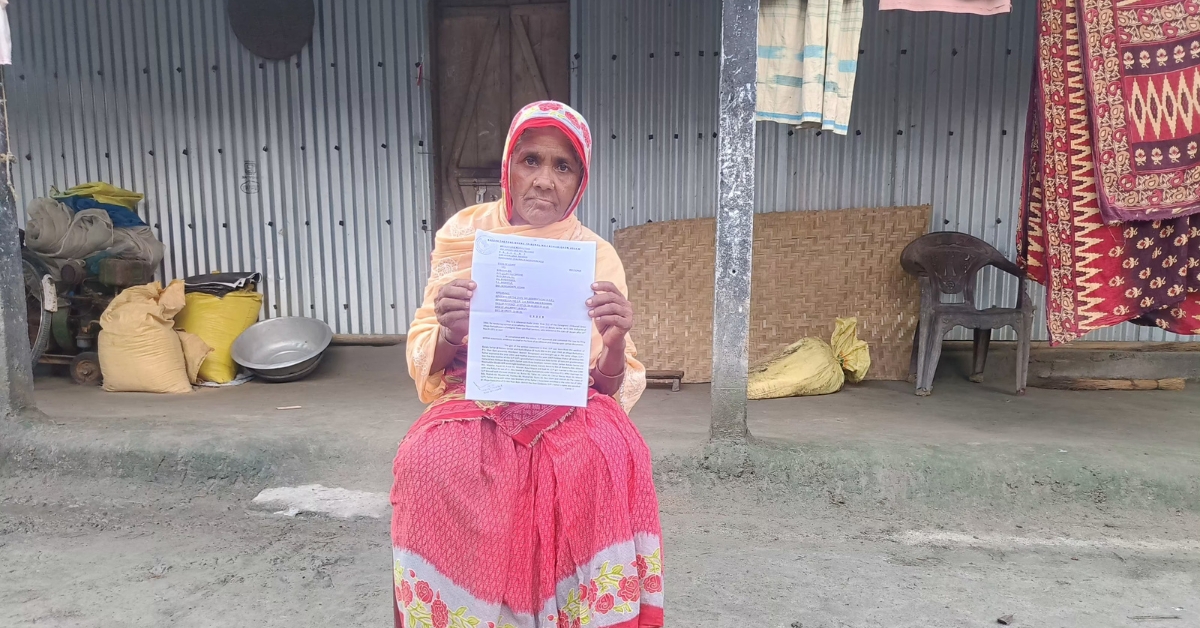In a landmark victory for Citizens for Justice and Peace (CJP), 56-year-old Banasha Bibi, a Bengali-speaking Muslim woman from Assam’s Bongaigaon district, was officially declared an Indian citizen by the Foreigners’ Tribunal No. 1, Bongaigaon on June 25, 2025. This decision comes after a 22-year-old illegal foreigners’ case, filed in 2002, was finally heard following CJP’s intervention in 2023.
For Banasha Bibi, a paralysis patient who has lived her entire life in Assam, the declaration is more than a legal win. It is a validation of identity long denied and a hard-won end to state-inflicted trauma that began when a notice suddenly arrived accusing her of being a Bangladeshi.
Every week, CJP’s dedicated team in Assam, comprising community volunteers, district volunteer motivators, and lawyers, provides vital paralegal support, counseling, and legal aid to many affected by the citizenship crisis in over 24 districts in Assam. Through our hands-on approach, 12,00,000 people successfully submitted completed NRC forms (2017-2019). We fight Foreigner Tribunal cases monthly at the district level. Through these concerted efforts, we have achieved an impressive success rate of 20 cases annually, with individuals successfully obtaining their Indian citizenship. This ground level data ensures informed interventions by CJP in our Constitutional Courts. Your support fuels this crucial work. Stand with us for Equal Rights for All #HelpCJPHelpAssam. Donate NOW!
Banasha Bibi along with her husband, outside their home
The Case: A forgotten reference resurfaces
Banasha Bibi was born in 1968 in Barbakhara village, Manikpur police station, Bongaigaon district, to Batalu Sardar (also known as Batasu Sardar) and Ajufa Khatun. She married Rafijal Ali in 1980 and has resided in Assam her entire life, raising thirteen children. Despite possessing valid Indian documents across decades, Banasha Bibi was suddenly served a notice in 2022, twenty years after a reference was made in 2002 (Ref. No. IM(D)T/Case No. 761/2002), accusing her of being an illegal migrant from Bangladesh.
For twenty years, Banasha was unaware that her citizenship had been challenged. The tribunal admitted that the delay itself raised serious concerns, and that the investigation violated basic legal norms. Despite this, she was forced to prove her citizenship—an overwhelming task for someone with no legal training, limited mobility, and minimal resources. That’s when CJP stepped in with full legal, paralegal, and logistical support.
A deeply flawed investigation
CJP’s legal team, led by Advocate Dewan Abdur Rahim, junior advocate Sahidur Rahman, and state in-charge Nanda Ghosh, methodically dismantled the case against Banasha by submitting robust documentation and witness testimony to the Tribunal. The CJP legal team exposed the severe procedural violations and falsehoods underpinning the reference against her:
- No investigation was conducted: The Investigating Officer (I.O.) submitted a fabricated report. He never visited her home, never issued a notice, and never examined any witnesses. Statements supposedly recorded from Banasha Bibi and others were concocted without interaction.
- No documentary evidence seized: The I.O. failed to seize or produce any document—passport, identification, or otherwise—to substantiate the claim that Banasha Bibi was a foreigner.
- No proof of foreign origin: The inquiry report lacked the name or address of any foreign country, and did not trace any alleged cross-border movement.
- Violation of legal procedure: There was no compliance with the procedure mandated under the Foreigners Act or principles of natural justice. Crucially, the notice reached Banasha only in 2022—20 years after the case was registered, making the very reference barred by limitation.
CJP’s Legal Defence: Documents, testimony, and due process
CJP provided comprehensive legal and paralegal support, filing affidavits, marshalling evidence, and presenting multiple witnesses. CJP placed on record a comprehensive set of documents that proved Banasha Bibi’s deep roots in Assam, including:
- Voter lists:
- Her father, Batalu Sardar, appeared in the 1959, 1966, and 1970 rolls—long before the March 25, 1971 cut-off.
- Banasha herself was listed as a voter in 1989, 1993, 1997, 2006, 2010, 2019, and 2022.
- Identity documents:
- Elector Photo Identity Card (EPIC)
- Aadhaar Card
- PAN Card
- Ration Card
- One from Secretary, Nowapara Gaon Panchayat, affirming her identity and parentage.
- A second confirming her marriage to Rafijal Ali and her family lineage from the same locality.
- Gaon panchayat certificates:
- One from Secretary, Nowapara Gaon Panchayat, affirming her identity and parentage.
- A second confirming her marriage to Rafijal Ali and her family lineage from the same locality.
Oral Testimony:
- DW-2 (GP Secretary Mrinendra Sarma) authenticated the certificates issued from GP records.
- DW-3 (Rajab Ali) testified as her brother, identifying Batalu Sardar as their father and confirming their shared familial history.
- DW-4 (Sahalam Ali), a neighbour, corroborated that Banasha was born and raised in Barbakhara.
These testimonies met the standard under Section 50 of the Indian Evidence Act, proving her parentage and longstanding community recognition.
The Tribunal’s Verdict: Citizenship proven beyond doubt
In his reasoned order, Tribunal Member Dulal Saha accepted the documentary and oral evidence, affirming that Banasha Bibi was born in Assam, had lived there continuously, and had cast votes for decades. On July 25, 2025, CJP’s Assam team formally handed over the tribunal’s certified order to Banasha Bibi’s family at Barbakhara. Her family expressed deep gratitude to CJP for their unwavering support in the face of state negligence and intimidation.
Banasha Bibi’s acquittal is a personal victory, a legal triumph, and a moral indictment of Assam’s discriminatory foreigner detection regime. Her case underscores how citizenship trials have become tools of marginalisation, not justice.
It also reveals the essential role of civil society organisations like CJP in safeguarding constitutional rights when the state fails its own people.
Banasha’s courage, despite her health condition, and CJP’s tireless advocacy have restored one woman’s legal identity—but thousands remain entangled in similar, unjust proceedings. As Assam continues to witness arbitrary detentions and foreigner references, the case of Banasha Bibi stands as both a victory and a warning: the Constitutional promise of equality and due process must not be hollowed out by bureaucratic callousness or prejudice.
Related:

